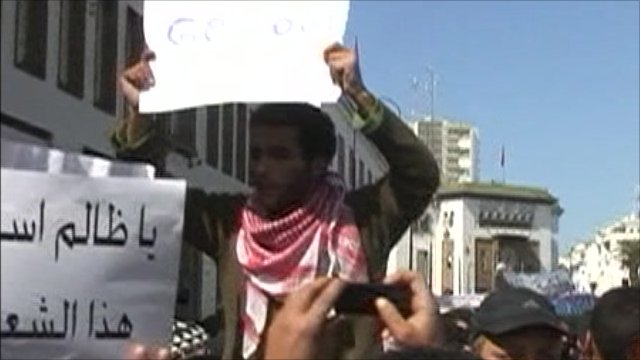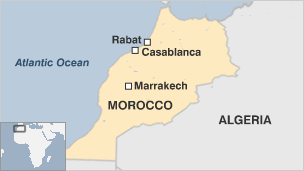BAK
JF-Expert Member
- Feb 11, 2007
- 124,790
- 288,006
Morocco protesters demand political change

Click to play
The BBC's John Sudworth said protests in Rabat had been peaceful
Thousands of people have marched in Moroccan cities to demand that King Mohammed VI give up some of his powers.
In the capital, Rabat, police allowed protesters to approach parliament, chanting slogans like "The people reject a constitution made for slaves!"
A separate protest is under way in the country's biggest city, Casablanca, and another was planned in Marrakesh.
Protests have spread across the region since popular movements in Tunisia and Egypt forced out leaders.
Sunday's rallies in Morocco are organised by groups including one calling itself the February 20 Movement for Change.
More than 23,000 people have expressed their backing for its Facebook site.
The protesters have not called for the removal of King Mohammed, but for a new constitution curbing his powers.
"This is a peaceful protest to push for constitutional reform, restore dignity and end graft," said Mustapha Muchtati of the Baraka (Enough) group, one of the organisers behind the protest.
Continue reading the main story

Analysts say that - unlike other countries that has seen protests - Morocco has a successful economy, an elected parliament and a reformist monarchy, making it less vulnerable to a major uprising than other countries.
"Most of what these people and organisations are calling for has been on the political scene for quite some time - political change, freedom, reform, change in the constitution," political analyst Abdelhay Moudden told the BBC.
Former BBC Morocco correspondent Richard Hamilton says regular protests are allowed, the economy is growing and the government has promised to double food subsidies.
But beneath the surface real problems are lurking, he adds - with a huge young population, many of them poor or unemployed; a gap between rich and poor described by one commentator as "obscene"; and parliamentary elections said by critics to be a fig leaf for an undemocratic system.
King Mohammed is a member of the Alaouite dynasty that has been ruling Morocco for some 350 years, claiming a direct line of descent from the Prophet Muhammad.
It is regarded as almost sacrilegious to question his role as king, our correspondent says.

Click to play
The BBC's John Sudworth said protests in Rabat had been peaceful
Thousands of people have marched in Moroccan cities to demand that King Mohammed VI give up some of his powers.
In the capital, Rabat, police allowed protesters to approach parliament, chanting slogans like "The people reject a constitution made for slaves!"
A separate protest is under way in the country's biggest city, Casablanca, and another was planned in Marrakesh.
Protests have spread across the region since popular movements in Tunisia and Egypt forced out leaders.
Sunday's rallies in Morocco are organised by groups including one calling itself the February 20 Movement for Change.
More than 23,000 people have expressed their backing for its Facebook site.
The protesters have not called for the removal of King Mohammed, but for a new constitution curbing his powers.
"This is a peaceful protest to push for constitutional reform, restore dignity and end graft," said Mustapha Muchtati of the Baraka (Enough) group, one of the organisers behind the protest.
Continue reading the main story

- Led by King Mohammed, seen as a reformist while retaining sweeping powers
- Population 32.3 million, land area 710,850 sq km, including Western Sahara
- Median age 26.5, literacy rate 56%
- Gross National Income per head: $2,770 (World Bank)
Analysts say that - unlike other countries that has seen protests - Morocco has a successful economy, an elected parliament and a reformist monarchy, making it less vulnerable to a major uprising than other countries.
"Most of what these people and organisations are calling for has been on the political scene for quite some time - political change, freedom, reform, change in the constitution," political analyst Abdelhay Moudden told the BBC.
Former BBC Morocco correspondent Richard Hamilton says regular protests are allowed, the economy is growing and the government has promised to double food subsidies.
But beneath the surface real problems are lurking, he adds - with a huge young population, many of them poor or unemployed; a gap between rich and poor described by one commentator as "obscene"; and parliamentary elections said by critics to be a fig leaf for an undemocratic system.
King Mohammed is a member of the Alaouite dynasty that has been ruling Morocco for some 350 years, claiming a direct line of descent from the Prophet Muhammad.
It is regarded as almost sacrilegious to question his role as king, our correspondent says.